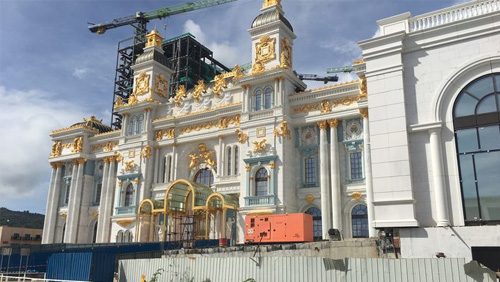Lu Hou Tsai, senior vice president of operations for Imperial Pacific Holdings Ltd. (IP), has confirmed that the company is moving forward with plans to build a permanent casino resort on the island of Saipan. The statement comes at the same time that Imperial Pacific announced that it is going after Bloomberg and two of the media outlet’s reporters over a series of critical articles regarding the company.
 In an interview with GGRAsia, Tsai said, “This project will go through. We are working diligently to get the hotel up, because once the hotel is up, that will further assist us in increasing our cash flow.”
In an interview with GGRAsia, Tsai said, “This project will go through. We are working diligently to get the hotel up, because once the hotel is up, that will further assist us in increasing our cash flow.”
IP has been working on the Imperial Pacific Resort for some time, but has had a series of setbacks along the way. Nonetheless, the company’s final design for 350 hotel rooms and 15 villas is progressing forward.
“It’s not conducive to business when you have customers staying at ‘this hotel, that hotel,'” noted Tsai, referring to the present need to accommodate its existing gambling customers in other hotel properties. “Right now, we have over 1,000 construction workers on site, and our construction company is a U.S.-based construction company.”
The latter comment was a direct response to concerns that the company had not been adhering to its construction agreement. According to the IP executive, OSHA gave the company its blessing, “so we are 100 percent good to go as far as ramping up our construction efforts are concerned.”
In accordance with its agreement for a casino license on the U.S. territory, IP must have an “initial gaming facility” in place by the end of August. That facility is required to have a gaming floor measuring 152,201 square feet (14,140 square meters), 329 hotel rooms, food and retail outlets and a meeting space. However, the operator requested an extension of the deadline due to construction delays.
Meanwhile, IP has sued Bloomberg and the two reporters, Matthew Campbell and K Oanh Ha, in a Hong Kong court. According to the media outlet Marianas Variety, the High Court of Hong Kong’s Court of First Instance has issued a writ to Bloomberg, which was named the first defendant in the lawsuit.
IP claimed that it was the subject of erroneous and misleading reports that began in February. Bloomberg reported that IP was guilty of influencing local officials in order to be granted the casino license and that the main offices of IP had been raided by the FBI, a claim repeatedly denied by IP executives.